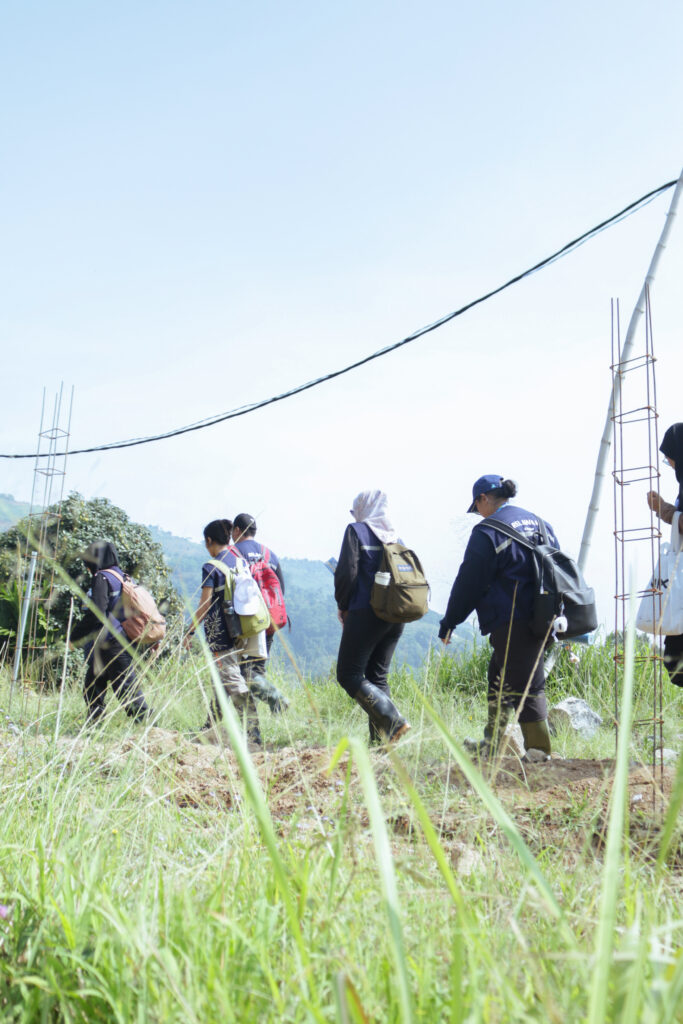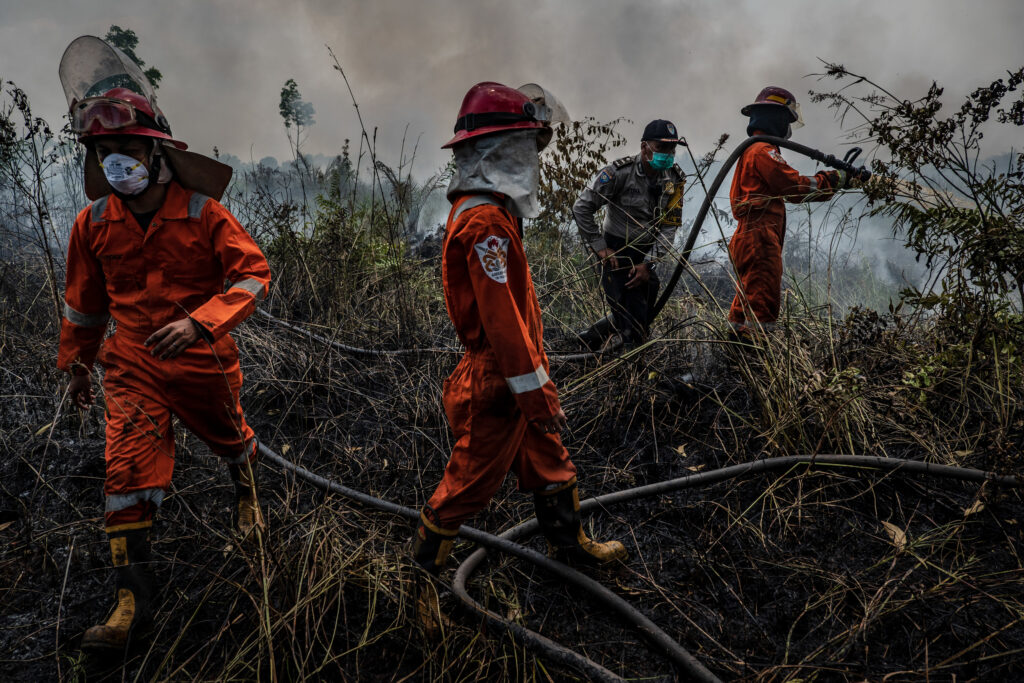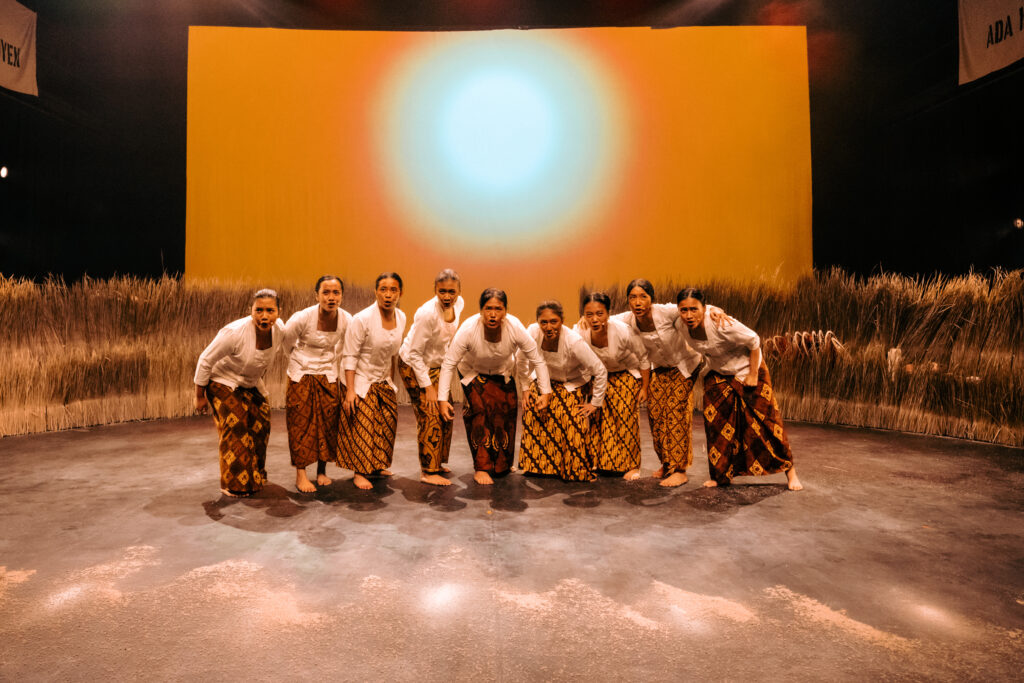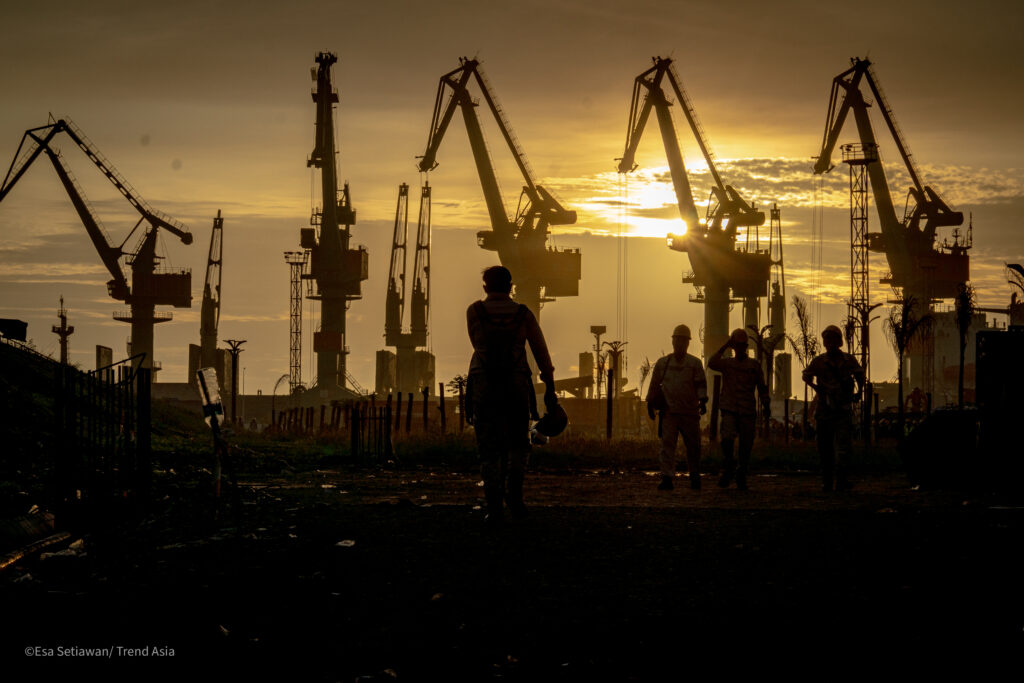Reflecting on Seven Stories of Displacement, Courage, and Hope
The firefly is more than a flicker of light – it’s a vital bioindicator, and a sentinel of nature’s balance. For millions of years, the presence of the insect’s silent spark has signaled clean air, pristine water, and low levels of light pollution. However, as critical habitats vanish, pollution taints the air, wild forests turn to ash, and coastlines sink, its light begins to dim – a subtle warning of what we stand to lose.
The #WasHere campaign is a call to remembrance and hope. We urge you to remember clean air, pure water, and thriving peatland. To recall a time before reckless land exploitation, and to remember the millions of human and nonhuman lives displaced by systemic environmental degradation. We also encourage you to hope. To recognise every flicker of light and indicator of ecosystem health as a testament to resilience, and as a reminder that displacement marks not an end, but a beginning.
Through #WasHere, we do not dwell on loss, rather we defy erasure. Each organisation highlighted in this campaign works to record what has been harmed, displaced, or endangered. In doing so they communicate what endures– in the Land, in memory, in resistance, in existence, and in the dreams of future generations. We invite our readers to reflect on each of our roles in keeping these truths visible to ensure that the services of our ecosystem– from health and food security, to our sense of belonging and identity with the natural world– are elements of the past, but realities that endure for generations to come.
The Elang Jawa Was Here
Indonesia’s national bird –– The Javan hawk-eagle, known locally as Elang Jawa or Garuda –– is in grave danger, as forced displacement through illegal wildlife trade, habitat isolation, and deforestation threaten its survival. Today, an estimated 300-500 mature individuals remain. The raptor, which can only be found on the island of Java, is a crucial bioindicator species, as they offer clues about ecosystem health and diversity. The raptor symbolises Indonesia’s pride and spirit, but without urgent conservation efforts, the eagle, which is now one of the world’s most endangered raptors, is expected to go extinct by 2026.

Voluntrip by Kitabisa has responded to this crisis , supporting conservation efforts at Mount Halimun Salak National Park. The program is organised by the Indonesian crowdfunding platform, Kitabisa, and seeks to teach children the immense importance of conservation – instilling a sense of responsibility and hope for the future of the national bird.
Pandu, a local volunteer, shares: “Voluntrip has given me a space to learn and to explore the world and to expose myself to issues and problems so that I can know what I can do as a young person to contribute and take part in creating change in this world.” Pandu believes that young generations are the key to catalysing these changes,
“I really wish more people were conscious about environmental and animal rights issues, because the health of the environment and biodiversity are really, really important to our living.”
With over 700 trips and 12 cities, Voluntrip is one of the most impactful volunteer organisations in Indonesia – connecting individuals with their social networks and natural heritage.
Support Voluntrip by Kitabisa:
Follow and support Voluntrip on social media: @voluntrip.kitabisa
Support Voluntrip through program funding via kitabisa.com/voluntripkitabisa
Get involved in Voluntrip’s programs – information can be obtained through the IG account @voluntrip.kitabisa
Become part of the larger Kitabisa campaign related to animal welfare issues via @temanhewan.kitabisa
A Healthy Peatland Ecosystem Was Here

In South Sumatra, eleven residents are taking a stand against the plantation companies PT BHM, PT BAP, and SBA Wood Industries over the chronic smoke haze caused by the peatland fires in the company’s concessions, that have choked their communities with toxic haze for years. The fires, caused by reckless and inadequate land management, have robbed hundreds of families and species of their health, livelihoods, and future. Now, the plaintiffs have filed a lawsuit against the wood suppliers, and are demanding compensation for the deprivation of their right to a healthy environment. “Sinar Mas has failed to fulfill its promises to restore peatlands and nature because there’s more profit in destruction,” they say.
Indonesia’s tropical peatlands are a biodiversity wonder and a crucial carbon sink, storing 57 gigatons of carbon. But in the last few decades alone, plantation companies have drained and cleared these forests for palm oil, pulp, and paper, turning them into fire-prone wastelands. Once fireproof, these peatlands are now a ticking carbon timebomb, where a single spark can ignite wildfires that rage for weeks. One of the plaintiffs, whose swiftlet’s house was burned down by an unregulated fire near the PT Bumi Mekar Hijau concession, shares:
“I decided to become a plaintiff in the hope of reminding these companies about their wrongdoings: causing environmental destruction, fires, and prolonged haze. We are striving to remind both the government and corporations to better respect the community’s living space.”
The eleven activists, supported by Greenpeace Indonesia, are fighting to regain and restore the Sumatran peatlands, demanding accountability from corporations whose negligence has fueled these fires.
Support Greenpeace and the #ForestNotFire plaintiffs:
Donate to Greenpeace Indonesia
Use the hashtag #ForestNotFire and #BelumMerdekaDariAsap (“Not Free From Smoke-Haze”) to support the plaintiffs and sign the petition to stop unregulated peatland haze
Follow Greenpeace Indonesia on social media: @greenpeaceid
Ibu Bumi Was Here
For years, the women of the Kendeng region in Western Java have sustained their sacred motherland, “Ibu Bumi.” This karst landscape, composed of natural springs and limestone, provided vital resources for the livelihood of the Indigenous Kendeng people and their farming practices. In 2014, they discovered that a state-owned cement company was in the advanced stages of planning a large-scale mining project in the Kendeng Mountains – without consulting the farmers who depended on the land.

For two years, the Kendeng people peacefully resisted, blocking roadways and construction sites to defend their sacred land and future, only to be met with violent suppression and prosecution. As a last resort, nine brave women, who became known as the Kartinis of Kendeng, traveled over 500 km to the presidential palace in Jakarta and set their feet in cement in protest as a powerful and painful symbol of their resistance.
“We wanted to highlight the Kartini’s belief in the importance of protecting nature; as we come from the Earth and coexist with it.“
In honor of the ceaseless courage of the Kartinis of Kendeng, Jakarta Movin, Indonesia’s leading musical theater company, brought their story to the stage. 9Sembilu, directed by Barly Armandita and Pradipta Kartika (Tikka), honors these nine brave women—heroes fighting for their land, their future, and generations to come. Barly and Tikka share that “we wanted to highlight the Kartini’s belief in the importance of protecting nature; as we come from the Earth and coexist with it. Once we had the chance to connect with the nine Kartini Kendeng, we were starstruck—it felt like meeting heroes, literally. That’s how much appreciation and respect we have for them, for their courage in boldly fighting for their land. It became a point of reflection for us in living our own lives. It was an unexplainable realisation and feeling because, although I grew up in a city, the story of these female farmers’ struggles caught my heart and attention. It felt like there was a greater purpose beyond just presenting this on a musical stage. The entire process flowed smoothly, and it felt like an intuitive calling to tell a story like this. ”
Support Jakarta Movin and 9Sembilu:
Follow and support Jakarta Movin on social media: @jakartamovin
Kabaena Was Here
On Kabaena Island in Southeast Sulawesi, Indonesia, the Bajau people, who are known as the world’s last sea nomads, have lived for generations from the ocean, free-diving up to 30 meters to fish with traditional spears. For the Bajau, the sea isn’t just home, it’s synonymous with their survival. But their way of life is now under threat.

Driven by global demand for electric vehicles, and Indonesia’s ongoing Downstreaming strategy — a rapid and reckless push to exploit its vast natural resources, Kabaena has become a hotspot for nickel mining — a key metal for EV batteries. Today, 73% of the island has been turned over to mining companies, despite explicit laws prohibiting the exploitation of small islands like Kabaena. The impact has been devastating.
A local organisation, Satya Bumi, has found that mining waste has polluted the sea with toxic heavy metals like mercury and lead, killing fish, destroying coral reefs, and poisoning the food the Bajau rely on. Exposure to the toxic pollutants has led to a rapid surge in skin diseases, organ failure, and cancer among the Bajau. The organisation shares:
“Kabaena was a place of great beauty, from the once pristine rivers and sea, to the magnificent mountains and forests. Now the beaches and rivers are contaminated, and the mountains scarred by nickel mining.”
The rush for “green” technology is leaving environmental destruction and human suffering in its wake, and the people of Kabaena and the other small islands in Indonesia are paying the price.
Satya Bumi is fighting back against these aggressive and exploitative projects. They work to protect Indonesia’s small islands, defend Indigenous rights and push for a democratic, just, and sustainable energy transition that protects people from displacement and their land from destruction.
Support Satya Bumi and the Bajau:
Watch and support Satya Bumi’s documentary on the Bajau
Follow and support Satya Bumi on social media: @satya.bumi
A Promise Was Here

In the mixed forests on Indonesia’s over 17,000 islands, the palm oil industry has cast a long shadow. While the Indonesian government claims that palm oil helps smallholder livelihoods, the reality proves to be far different. The wealth generated by palm oil remains concentrated among a few large corporations, many tied to powerful families. Meanwhile, small farmers are left with broken promises of rights that must be fulfilled, land tenure security and fair access to markets, and Indigenous communities across Indonesia continue to wait for the fulfillment of President Jokowi’s 2014 promise to protect their land and cultural rights.
For years, these communities have struggled, as the palm oil industry pushes them further into poverty and displacement. The government’s rhetoric does not match the harsh truth on the ground. Yet, despite the challenges, there is hope for change. Sawit Watch, an Indonesian-based NGO, has been addressing the pervasive exploitation relating to palm oil plantations since 1998. With a focus on social advocacy, fighting corruption and ecocide, the organisation works for social justice for farmers, laborers, and Indigenous/local communities.
In their annual report, they highlight the cruciality of reforming the system that exploits farmers and the environment:
“The government should focus on improving palm oil governance, particularly through intensification efforts rather than expansion. Palm oil moratoriums and the implementation of the Smallholder Replanting Program (PSR) are more viable and realistic strategies in the current context. Expanding palm oil plantations through extensification will only exacerbate deforestation, increase risks, and contribute to global climate change.”
Sawit Watch provides critical data and information, strengthens the bargaining power of local communities and facilitates conflict resolution. Through research, monitoring, and advocacy, they push for sustainable palm oil practices and promote policies that support the rights of small farmers, workers, and Indigenous peoples, while promoting ecological and social justice. Traction Energy Asia with SPKS – the palm oil farmers union – promotes the inclusion of small farmers in the biodiesel supply chain to improve their welfare and also to ensure a traceable supply chain. In addition, Traction Energy Asia promotes the use of used cooking oil as an alternative, sustainable biodiesel feedstock to reduce the risk of deforestation from land clearing to develop more palm oil plantations.
Support Sawit Watch and Indonesia’s palm oil farmers:
Share Sawit Watch and JATAM’s Stop Harita campaign: https://hentikanharita.jatam.org/
Follow and support Sawit Watch on social media: @sawitwatchofficial
A Clean and Safe Environment Was Here

In Morowali, Central Sulawesi, the frenetic expansion of nickel mining and smelting projects leaves local communities with more harm than hope. Every day, thousands of workers commute through roads choked with traffic and overflowing with unmanaged waste, to reach the IMIP smelting complex. Inside IMIP, harsh working conditions, unregulated hours, and unsafe environments have led to a rising toll of workplace accidents and deaths. The scene reflects the deep inadequacy of Indonesia’s dominant downstreaming strategy, which prioritised maximising extraction and consumption of critical minerals while turning a blind eye to human suffering and environmental destruction.
Students at local schools, situated dangerously close to the captive coal-fired plant, are plagued by air pollution and the industrial roar of IMIP’s operations, while unmanaged waste, lack of adequate health facilities, water pollution, and infrastructure collapse – remain unresolved in the greater Morowali region.
Nearby coastal towns like Kurisa and Fatufia, whose economies are largely dependent on fishing, are seeing unprecedented declines in marine life, as fish are driven away by water pollution and hot water discharged from smelters. Coal dust covers homes, clean water is scarce, and children have lost safe spaces to swim.
This destructive model of development cannot continue unchecked.
Local NGO, Trend Asia, works to accelerate an energy transformation rooted in clean, renewable energy, built fairly, sustainably, and with the crucial leadership of local communities. With a democratic economy, in which production, distribution, and consumption benefit people, not just corporations, we can begin to protect justice and sustainability for future generations.
Support Trend Asia and the people of Morowali:
Follow and support Trend Asia on social media: @trend_asia

#WASHERE is a social media campaign concept designed by Zafira Dhanni, coordinated by Linda Förster and Mary Martin, with visual design executed by Dorka Szender-Kisfaludy.
Use our #WASHERE hashtag to share your stories of displacement with us. The firefly stencil is available for download here. We hope you use it as a flicker of light, and a beacon of hope – cut it out; take it with you; paint it. Leave your light wherever you go.
Stay tuned for future editions!